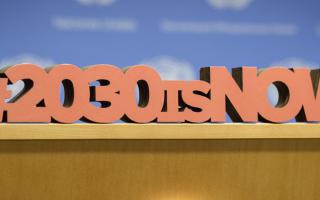Grant and Proposal Writing
Securing funding in today’s environment requires more than just good ideas - it demands well-crafted proposals that align organisational priorities with donor requirements. This five-week online course equips UN staff with core skills in proposal development, including needs assessment, project design, budgeting, monitoring and evaluation, and persuasive narrative writing.
Proposals are more than technical documents - they are strategic tools to communicate vision, build partnerships, and secure the resources needed for impact. This course situates proposal writing within the broader context of organisational strategy and donor engagement, helping participants see how their work contributes to larger institutional goals. It creates a structured space to learn from expert and peers while encouraging participants to connect the training directly to their daily responsibilities and ongoing projects.
Upon successful completion of this course, participants will be able to:
- Construct proposals that align with the organisation’s mission and strategy, and with donor requirements.
- Work with colleagues across the board to create better programmes and proposals.
- Map programmes and partners and identify the best funding opportunities.
- Make a logframe that connects objectives, activities, and outcomes.
- Use the terminology of grant proposals, such as outputs, outcomes, indicators, activities, etc.
- Create an action plan for their work over the next month and beyond.
This five-week course is delivered fully online and combines synchronous and asynchronous learning components.
The synchronous elements include 5 weekly instructor-led webinars on Zoom, facilitated by a course instructor. These sessions take place once per week from 2:00 p.m. to 4:00 p.m. (CET) and provide opportunities for direct interaction, discussion, and guided learning. Participants need a computer (or mobile device), a reliable internet connection, and a headset with a microphone or telephone connection for audio. We recommend using computer audio for optimal sound quality. No special software is required, but participants must be able to access Zoom. Instructions for access will be sent to registered participants, and we recommend testing access in advance.
The asynchronous components include self-paced study, discussion forums, and group activities on the UNSSC learning platform. These elements are available throughout the course, allowing participants to engage with content and peers at their own pace while respecting the overall course timeline. On average, participants should plan to dedicate at least two hours per week for self-paced learning, assignments, and course activities on the platform. The exact amount of time may vary depending on individual learning styles and engagement preferences.
The course covers the following topics:
- Week 1: Introduction and Partnerships – Course overview, funding landscape, the role of proposals in your organisation
Participants explore the wider funding landscape, the role of proposals in advancing organisational goals, and the types of partners and donors along with their requirements. A simple technique for aligning organisational needs with donor priorities is introduced, supported by exercises and discussions that help participants practice mapping needs and resources.
- Week 2: Grant Narrative - Understanding and writing the core of your proposal
This week focuses on understanding and drafting the core of a funding proposal.
Participants explore the purpose of a value proposition and theory of change and learn how to build a compelling grant narrative structured around problem, action, and impact. Through practical exercises, they practice outlining a narrative that effectively communicates their organisation’s goals and strategies to donors.
- Week 3: Budgeting, Monitoring & Evaluation, and More - Other parts of the proposal and how to integrate them
Participants are introduced to additional elements of strong proposals, including annexes, budgeting, and monitoring and evaluation. This week covers budget design in line with donor requirements, and clarifies essential concepts such as metrics, KPIs, indicators, outputs, and outcomes. Exercises and discussions give participants the opportunity to apply these ideas in practice, including completing a mini logframe template.
- Week 4: Assembling the Proposal - Preparing and submitting the full proposal
This week guides participants through preparing and finalising a complete proposal package. Topics include navigating donor templates and online submission platforms, coordinating with team members for review and quality control, and applying writing techniques to refine the proposal. A hands-on workshop with participant examples allows for peer feedback and practical application of the week’s lessons.
- Week 5: Looking Forward - Turning learning into action, and setting next steps
In the final week, participants reflect on what they have learned and set out concrete action plans for applying their new skills in the workplace. The course concludes with opportunities for open discussion, peer exchange, and collaborative planning to support ongoing learning and professional growth. Exercises encourage participants to share their next steps and strengthen connections for future collaboration.
This course is designed for UN staff engaged in developing or managing proposals and grants, including partnership officers, programme staff, and those working in resource mobilisation and donor relations.
This course can also be run as in-house/on-site training for an individual agency on demand - please get in touch with us for additional details and pricing.
The course fee of $1,100 covers full participation in the online course.





